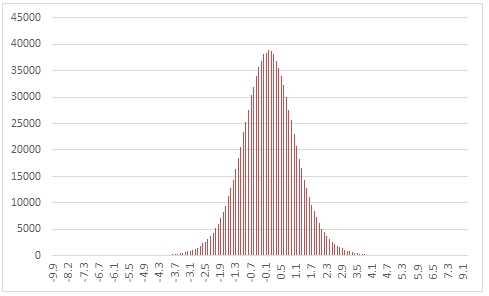SQL Server RANDTDIST Function
Updated 2023-10-18 19:36:36.863000
Description
Use the table-valued function RANDTDIST to generate a sequence of random numbers from Student's t distribution with parameter @df.
Syntax
SELECT * FROM [westclintech].[wct].[RANDTDIST](
<@Rows, int,>
,<@df, float,>)
Arguments
@Rows
the number of rows to generate. @Rows must be of the type int or of a type that implicitly converts to int.
@df
the degrees of freedom. @df must be of the type float or of a type that implicitly converts to float.
Return Type
table
{"columns": [{"field": "colName", "headerName": "Name", "header": "name"}, {"field": "colDatatype", "headerName": "Type", "header": "type"}, {"field": "colDesc", "headerName": "Description", "header": "description", "minWidth": 1000}], "rows": [{"id": "25a80935-ae01-439f-84df-7056159672d4", "colName": "Seq", "colDatatype": "int", "colDesc": "A monotonically increasing sequence number"}, {"id": "ea72d5e8-bd1f-436d-80ba-7f5e91ab0f35", "colName": "X", "colDatatype": "float", "colDesc": "The random variable"}]}
Remarks
@df must be greater than zero.
If @df is NULL then @Shape is set to 1.
If @Rows is less than 1 then no rows are returned.
Examples
In this example we create a sequence 1,000,000 random numbers rounded to one decimal place from a Student's t distribution with @df = 10, COUNT the results, paste the results into Excel and graph them.
SELECT X,
COUNT(*) as [COUNT]
FROM
(
SELECT ROUND(X, 1) as X
FROM wct.RANDTDIST( 1000000, --@Rows
10 --@df
)
) n
GROUP BY X
ORDER BY X;
This produces the following result.

In this example we generate 1,000,000 random numbers from a t distribution with @lambda of 6. We calculate the mean, standard deviation, skewness, and excess kurtosis from the resultant table and compare those values to the expected values for the distribution.
DECLARE @size as int = 1000000;
DECLARE @lambda as float = 6;
DECLARE @mean as float = 0;
DECLARE @var as float = CASE
WHEN @lambda <= 2 THEN
NULL
ELSE
@lambda / (@lambda - 2)
END;
DECLARE @stdev as float = SQRT(@var);
DECLARE @skew as float = 0;
DECLARE @kurt as float = CASE
WHEN @lambda <= 4 THEN
NULL
ELSE
6 / (@lambda - 4)
END;
SELECT stat,
[RANDTDIST],
[EXPECTED]
FROM
(
SELECT x.*
FROM
(
SELECT AVG(x) as mean_TDIST,
STDEVP(x) as stdev_TDIST,
wct.SKEWNESS_P(x) as skew_TDIST,
wct.KURTOSIS_P(x) as kurt_TDIST
FROM wct.RANDTDIST(@size, @lambda)
) n
CROSS APPLY
(
VALUES
('RANDTDIST', 'avg', mean_TDIST),
('RANDTDIST', 'stdev', stdev_TDIST),
('RANDTDIST', 'skew', skew_TDIST),
('RANDTDIST', 'kurt', kurt_TDIST),
('EXPECTED', 'avg', @mean),
('EXPECTED', 'stdev', @stdev),
('EXPECTED', 'skew', @skew),
('EXPECTED', 'kurt', @kurt)
) x (fn_name, stat, val_stat)
) d
PIVOT
(
sum(val_stat)
FOR fn_name in ([RANDTDIST], [EXPECTED])
) P;
This produces the following result (your result will be different).
{"columns":[{"field":"stat"},{"field":"RANDTDIST","headerClass":"ag-right-aligned-header","cellClass":"ag-right-aligned-cell"},{"field":"EXPECTED","headerClass":"ag-right-aligned-header","cellClass":"ag-right-aligned-cell"}],"rows":[{"stat":"avg","RANDTDIST":"0.000255903904467406","EXPECTED":"0"},{"stat":"kurt","RANDTDIST":"3.00998030754108","EXPECTED":"3"},{"stat":"skew","RANDTDIST":"0.0148237899631972","EXPECTED":"0"},{"stat":"stdev","RANDTDIST":"1.22461089322925","EXPECTED":"1.22474487139159"}]}
See Also
TINV - The inverse t distribution function
RANDBETA - Random numbers from a beta distribution
RANDBINOM - Random numbers from a binomial distribution
RANDCAUCHY - Random numbers from a Cauchy distribution
RANDCHISQ - Random numbers from a chi-squared distribution
RANDEXP - Random numbers from an exponential distribution
RANDFDIST - Random numbers from an F-distribution
RANDGAMMA - Random numbers from a gamma distribution
RANDLAPLACE - Random numbers from a LaPlace distribution
RANDLOGISTIC - Random numbers from a logistic distribution
RANDNORMAL - Random numbers from the normal distribution
RANDPOISSON - Random numbers from a Poisson distribution
RANDSNORMAL - Random numbers from the standard normal distribution